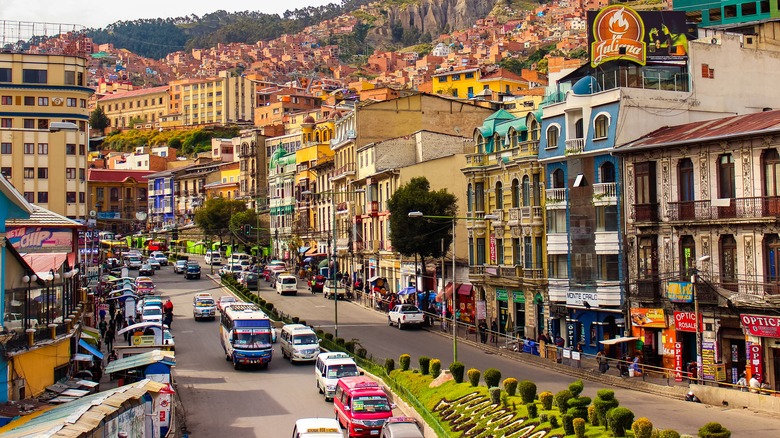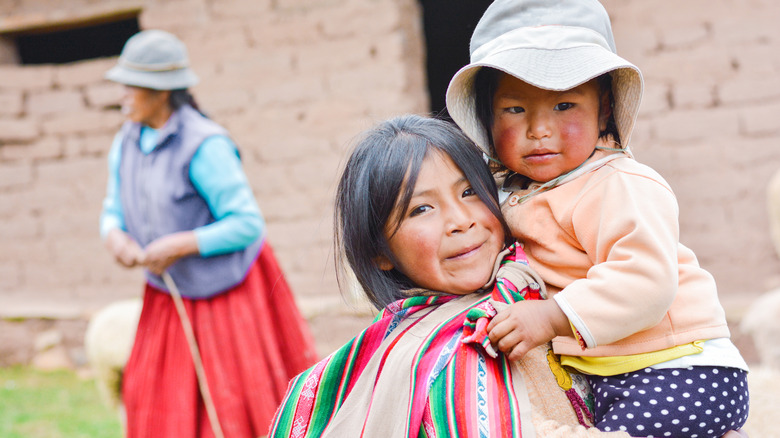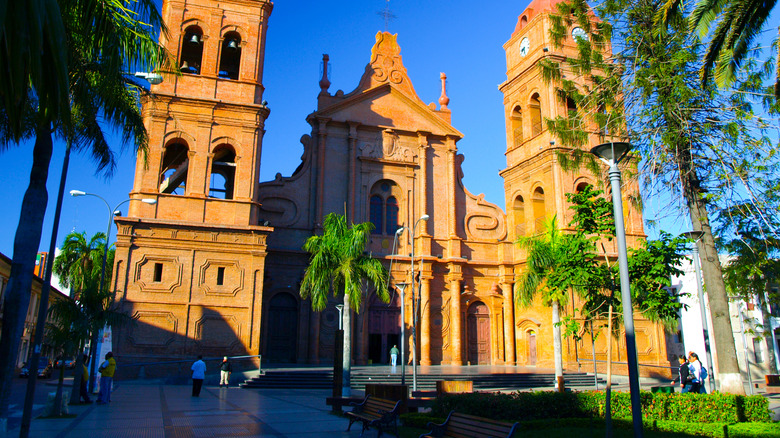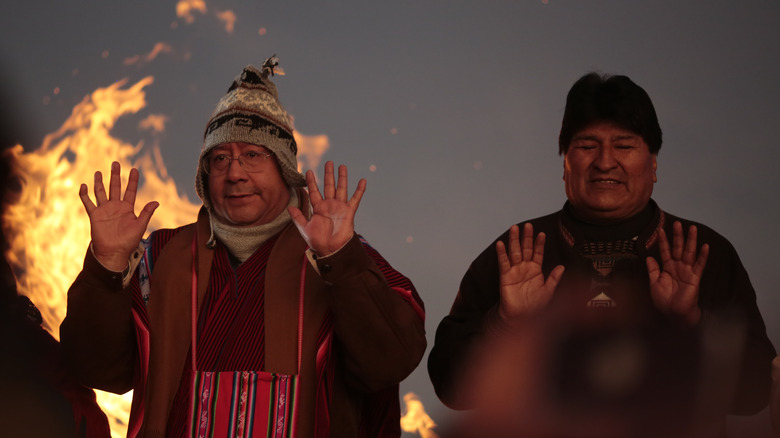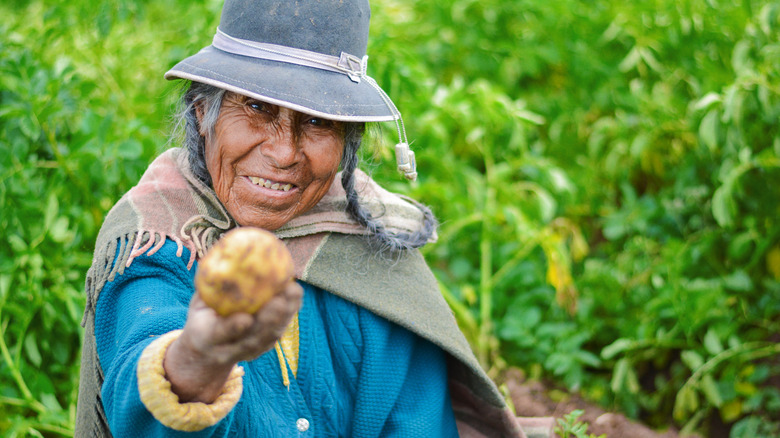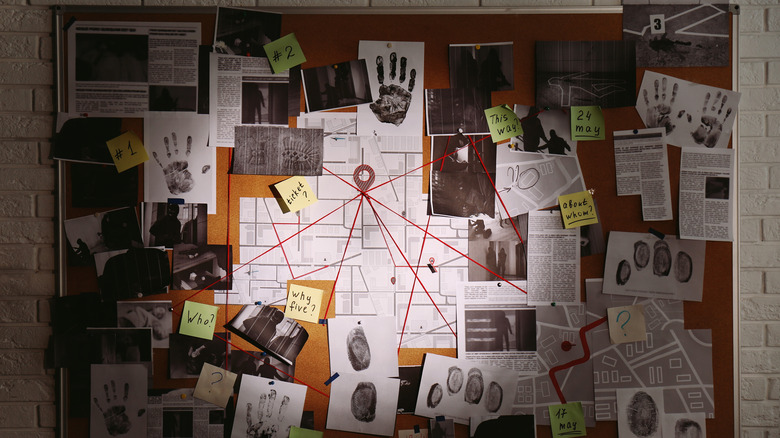Bolivia's Festival Of The Skulls Explained
Take a trip to La Paz, Bolivia, on November 8, and you might be curious as to why crowds of people are gathering at graveyards carrying around decorated ... human skulls? The festival is known as Día de las Ñatitas, or Festival of the Skulls. It starts at the crack of dawn when people visit the central cemetery carrying around human skulls that are decorated in different types of fashions — some with jewelry, hats, cigarettes, or even sunglasses. Sometimes they are carried around in cardboard boxes, whereas others are carried in delicate wooden crates, according to Culture Trip.
The skulls are placed on a bed of flowers, and a celebration occurs. Musicians will come out and serenade the ñatitas, which is the local Aymaran name given to the skulls, and after a whole day of partying and spending time with the ñatitas, it is believed a positive relationship will be formed with the spirit, blessing you with good fortune (via Culture Trip).
Día de las Ñatitas
The celebration of Día de las Ñatitas gets its origin from the Aymara people, who come from the Altiplano region of the Andes mountains (via Smithsonian). The Aymara believe that there are seven souls within the human body, and upon death, six of these souls go to the afterlife, whereas the seventh soul remains in the skull (per Culture Trip). The body is then laid to rest, and after a while, the skull is dug up and given to someone to form a relationship with, though it doesn't have to be a family member. In fact, most ñatitas are owned by people who didn't even have a relationship with the person in question while they were living.
The celebration has been going on since before the Spanish came to what is now known as Bolivia in the 16th century, and to the Aymara people, the celebration is a symbol of how they view death. According to Milton Eyzaguirre Morales, the director of outreach at Bolivia's National Museum of Ethnography and Folklore, the Festival of the Skulls is not an evil event. He said (via Al Jazeera America), "This is a fundamental fact in the Andean context: Death is the origin of life. It's not like in the Western concept, where death is something macabre."
Conflicts with the Church
The ritual has been frowned upon by the Catholic Church since the first European encounter with the Aymara people. The Spanish forced the Aymarans to convert to Christianity and had anyone who used skulls in rituals tried for necromancy and witchcraft, according to Smithsonian. However, this only made the rituals go on in secret or in rural areas where Aymaran farmers lived far away from the city.
In the 1970s, many of these farmers came to the cities in order to look for work and brought these traditions with them, making them more and more popular within the local culture (though the Catholic Church still frowns upon these rituals). In 2003, when the La Paz church banned people from bringing skulls into their premises, the building was vandalized by an angry crowd who were very proud of their tradition. Since then, there has been a controversy about the intermixing of these cultural ideas that seem to be at odds with one another, according to Culture Trip.
Evo Morales' Impact
The Evo Morales presidency of Bolivia helped with the popularity of the Día de las Ñatitas and Aymaran culture in general. Morales, who is Aymaran himself, was president of Bolivia from the years 2006-2019 before resigning due to alleged election irregularities in the 2019 presidential election. People made claims that Morales and his party tampered with the election results, though the claims have been disputed, according to The New York Times.
During his presidency, Morales made a considerable effort to help indigenous communities and made it one of his top priorities. Some of his major policies included changing the official name of the former Republic of Bolivia to the Plurinational State of Bolivia, which gave 36 indigenous people groups official status, according to The Guardian. Since he was forced to resign in 2019, some have made efforts to roll back some of his government's friendliness toward the Aymaran people, such as a congresswoman who claimed Aymaran rituals were "satanic," according to The Guardian.
History with Skulls
In Aymaran culture, each ñatita has its own individual personality, and its thought that if you a foster a good relationship with your ñatita, it will protect your home. However, it's not like the Day of the Dead in Mexico, where celebrating ñatitas is a way to honor your ancestors, according to Smithsonian. Rather, many ñatitas that people own in Aymaran culture are heirlooms — passed around or even bought by certain vendors — with their very own personalities, just like living people.
Most of the time, these ñatitas are collected from local graveyards and medical students, and it's not always guaranteed that you will have a good relationship with your ñatita. Skulls have been used by Aymaran people for generations in ritualistic concepts, and farmers used to bury skulls where they would grow crops as a way to bless the land (via Smithsonian). People have different concepts of what you should do to serve your ñatita, like Ochoa Mollinedo, who says (via Al Jazeera America), "Some people say if you don't make the offerings they will do bad things to you, but I don't see it that way. I know he's always going to love me and care for me. When I need him he'll be there."
Ñatitas After the Festival
Once the sun sets, that's where the fun begins — the ñatitas are left at the graveyard while the people go to parties called prestas. At the prestas, they celebrate the ñatitas, but for the rest of the year, the ñatitas live a pretty dormant life. Many people have multiple ñatitas, which are believed to aid in everything from protecting your house from robberies to healing members of your household while they are sick, according to Smithsonian.
Some believe that the ñatitas help businesses, and in the city of La Paz, there are two ñatitas, Juanito and Juanita, that help solve crime at the local police department. Police officers say that the ñatitas help gets criminals to confess their crimes and also help solve cases, according to the Smithsonian. Over the last couple of decades, the popularity of the "Día de las Ñatitas" — or the Festival of the Skulls — has only continued to grow, and it's likely that it will become a larger part of Bolivian culture for years to come.
